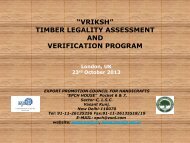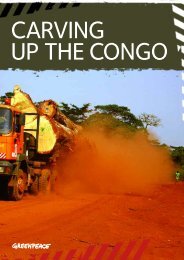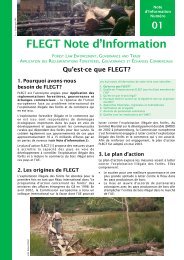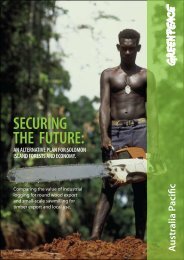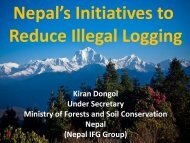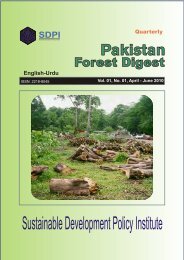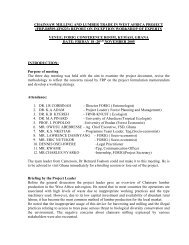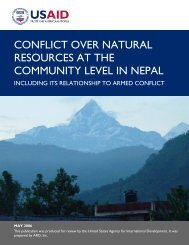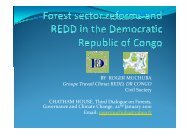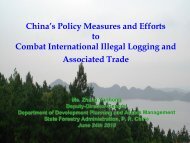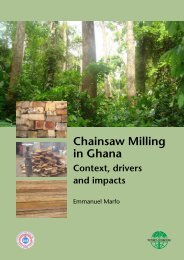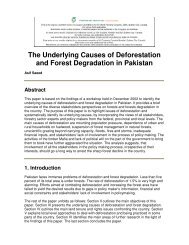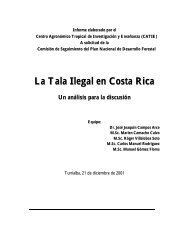download document - Rights and Resources Initiative
download document - Rights and Resources Initiative
download document - Rights and Resources Initiative
- No tags were found...
You also want an ePaper? Increase the reach of your titles
YUMPU automatically turns print PDFs into web optimized ePapers that Google loves.
Historical <strong>and</strong> contemporary l<strong>and</strong> laws <strong>and</strong> their impact on indigenous peoples’ l<strong>and</strong> rights in Ug<strong>and</strong>a:The case of the Batwaenvironment in the high mountainous forest areas around Lake Kivu <strong>and</strong> Lake Edward. 9 Theforest was their main source of livelihood; it met their needs for medicine, food, constructionmaterials, other socio-economic activities, <strong>and</strong> spiritual needs. Honey, animal meat <strong>and</strong> skinswere major articles for exchange. 10 Medicinal plants <strong>and</strong> scented woods could also beexchanged for cultivated foods, metal, or money. 11The Batwa’s l<strong>and</strong> rights have been slowly but surely eroded to the point of extinction. They losttheir forest l<strong>and</strong> gradually, by means legal <strong>and</strong> illegal. Key among these was Legal Notice N0.21 of 1930 by the Colonial Government, which gazetted Mgahinga Forest as a gorilla sanctuary.The final blow to the Batwa’s substantive rights to the forest l<strong>and</strong> came in the Forest Act of1947 <strong>and</strong> the National Parks Act of 1952, which recognised only access rights for communitieslike the Batwa. Subsequent post-independence legislation did not repeal these laws but built ontheir precedent, leaving the Batwa’s substantive l<strong>and</strong> rights obscure. In 1991, the Batwa wereformally evicted without compensation from the forest, although they have maintained accessto it cl<strong>and</strong>estinely. As a result of eviction, a hunter–gatherer community has been turned intoan overwhelmingly l<strong>and</strong>less cultivating or labouring group.Article 26 of Ug<strong>and</strong>a’s Constitution protects all Ug<strong>and</strong>ans’ right to ‘property’. Article 21 forbidsany discrimination on grounds of ethnicity. Failure to recognise <strong>and</strong> protect the Batwa’sinterest in their ancestral l<strong>and</strong>, therefore, amounts to a violation of their Constitutional rights.Laws passed in the pursuit of environmental protection or preservation raise pertinent issuesabout the Batwa’s l<strong>and</strong> rights in Ug<strong>and</strong>a today. In order to boost tourism, the government ofUg<strong>and</strong>a has focused on natural resources such as forests <strong>and</strong> game parks, which have beenclassified as reserves under government conservation policies. Conservation of such areas isalso a sign of cooperation with the international community in the fight against globalwarming. This study shows how the Wildlife Act (2000) <strong>and</strong> National Environment Act (1995)deviate from the supposed government obligation to protect the Batwa’s l<strong>and</strong> rights. The Batwawere not involved in the processes leading to the establishment of game parks in the forestareas that they occupied, nor have they participated in the establishment, management orplanning of protected areas. Worse still, the Batwa were ignored in the aftermath of theireviction. The government did not put in place adequate <strong>and</strong> comprehensive compensation toall dispossessed Batwa. Compensation was paid to a few, <strong>and</strong> only in response to lendingconditionalities set by the World Bank. No measures were taken to facilitate the Batwa’stransition to settlement. 12 At present, the Batwa are caught between two opposing worlds: thatof agriculturalists <strong>and</strong> cultivators, who wish to exploit them, <strong>and</strong> that of conservationists, whoby closing the forest have put an end to their hunting <strong>and</strong> gathering, 13 <strong>and</strong> rendered theml<strong>and</strong>less. 14 All of this should be viewed against the backdrop of international human rightsinstruments (to which Ug<strong>and</strong>a is party) that provide for a wide range of rights that a countryshould avail to its people generally, including indigenous peoples. These include (but are not9 FPP, UOBDU <strong>and</strong> CARE (2008), p 1.10 Kingdom (1990), p 238.11 Ibid.12 Ibid., p 247.13 Ibid.14 Ibid., p 238.Nakayi 2January 2009



